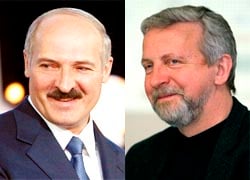Milinkevich’s website: Actions of Lukashenka to defend sovereignty more important than political liberalization
163- 18.09.2009, 11:58

The team of Milinkevich considers the trip of Belarusian dictator to Vilnius a wise step.
At the corporate website of the former presidential candidate Alyaksandr Milinkevich, a document by one of the main advisors of Milinkevich, Andrei Lyakhovich, is published in the column of Analytics. The document is called “Development of the situation in Belarus in first half of September-2009: main events and commentaries”. In the section “Recommendations” it is said:
“To our mind, considering the threat to independence of Belarus by Russia, the West shouldn’t make demands which are absolutely unacceptable for Lukashenka’s regime. In the run-up to the presidential elections (possibly in 2010) one shouldn’t rigorously insist on liberalization of the election law, on including all the independent media into the state system of distribution, on giving air time for oppositionists…
…In the context of the existing threat from Russia, one should treat political liberalization in Belarus as an unavoidably slow process. Because of its crisis state, opposition won’t be able to use it for a long time. On the other hand, excessively increased process of political liberalization could create additional possibilities for pressure from the side of Russia…
…Extending of cooperation between Belarus and the EU in the framework of the Eastern Partnership shouldn’t be strictly preconditioned by steps of Lukashenka’s regime towards political liberalization. In order to strengthen independence of Belarus, widen cooperation of Belarus with the West, one should first of all use possibilities of cooperation with the authorities: expand trade and economic relations, cooperation in the framework of the Eastern Partnership, trans-border cooperation.
Considering the crisis state of the Belarusian opposition and the threat from Russia, the following should be noted.
The actions of Lukashenka’s regime aimed at defence of sovereignty in the relations with Russia and at widening the cooperation with the West are of greater importance for interests of the West and for Belarusian national interests, than political liberalization in Belarus.
A policy of moderate pressure on Lukashenka’s regime seems the most effective policy.
It should be consistently maintained that there should be no political prisoners in Belarus. Possibilities for the civil society and independent press in Belarus should be expanded:
1. Article 193-1 of the Criminal Code that envisages criminal responsibility for activities on behalf of unregistered public associations and political parties should be abolished.
2. Terms of renting premises for headquarters of public associations should be improved and their legal addresses’ registration facilitated.
3. Articles 367, 368, 369 of the Criminal Code which allow persecuting journalists for their professional activities, must be abolished.
4. The practice of politically motivated dismissals and expulsions form universities must be stopped.
5. Legal and administrative hindrances for humanitarian and educational contacts of Belarusian children and youth with the outside world should be removed.
To our mind, the Special Guest status in the PACE for Belarusian parliament is untimely.
The invitation of Lukashenka to the Lithuanian-Belarusian economic forum is a right step of the Lithuanian government also in the context of promoting positive changes in Belarus, expanding cooperation of Belarus and the EU. However, the invitation should have been postponed to a different day of the forum. Lukashenka’s arrival to the EU capital on September 16, on the anniversary of disappearance (murder, to be more exact) of one of the opposition leaders V. Hanchar, is a signal for the authorities that the EU is ready to conduct a dialogue on Lukashenka’s terms…
…Lukashenka offers the West to develop cooperation on the grounds that Belarus respects the conditions of a certain geopolitical contract. He shouldn’t yield to Russia. He shouldn’t recognize independence of South Ossetia and Abkhazia. He should participate in Eastern Partnership. He should insistently invite Western business into the country. He should be interested in development of trade and economic relations.
Lukashenka’s team thinks that the West won’t return to the policy of sanctions, would continue “pull Belarus away” from Russia. Lukashenka said about three lines of cooperation the West really chooses to work now.
The government has returned to the practice of repressions against opposition in February 2009, in the run-up to March decision of the EU on sanctions. The regime finds it necessary to give the same signal to the West now: it shouldn’t be demanded steps in the direction of political liberalization”.
A note by www.charter97.org website: Now it is absolutely clear on which analysis the “strategy” of Alyaksandr Milinkevich is based. IT is cooperation with the regime. The leader of human rights and educational organisation “For Freedom” movement has been trying to persuade Western politicians for a long time that no pressure should be used against the Belarusian dictator, as only Lukashenka is a guarantor of the sovereignty of Belarus and a defender from Russia. However the abovementioned analysis work does not have a word about the beginning of the largest Russian-Belarusian military drills in the history of modern Belarus. The chief adviser of Milinkevich, analyst Lyakhovich, hasn’t noticed Russian trains of military equipment and 6,000 Russian soldiers, bombers and fighter planes of Russia. There isn’t a word in the document that the Belarusian delegation at the UN General Assembly opposed territorial integrity of Georgia, that Lukashenka agreed for Belarusian army’s participation in the Collective Operational Reaction Forces of the CSTO, that the second stage of drills of these punitive forces is taking place already. And it is not by chance, as the whole concept of allegedly pro-European aspirations of Lukashenka collapses then.










